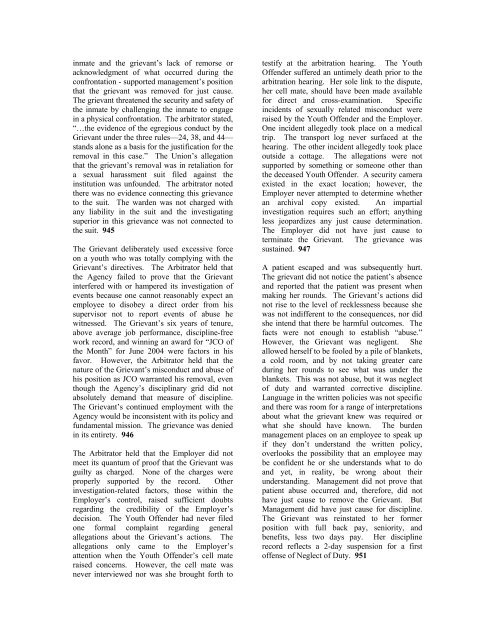by Contract Number (PDF) - OCSEA
by Contract Number (PDF) - OCSEA
by Contract Number (PDF) - OCSEA
You also want an ePaper? Increase the reach of your titles
YUMPU automatically turns print PDFs into web optimized ePapers that Google loves.
inmate and the grievant’s lack of remorse or<br />
acknowledgment of what occurred during the<br />
confrontation - supported management’s position<br />
that the grievant was removed for just cause.<br />
The grievant threatened the security and safety of<br />
the inmate <strong>by</strong> challenging the inmate to engage<br />
in a physical confrontation. The arbitrator stated,<br />
“…the evidence of the egregious conduct <strong>by</strong> the<br />
Grievant under the three rules—24, 38, and 44—<br />
stands alone as a basis for the justification for the<br />
removal in this case.” The Union’s allegation<br />
that the grievant’s removal was in retaliation for<br />
a sexual harassment suit filed against the<br />
institution was unfounded. The arbitrator noted<br />
there was no evidence connecting this grievance<br />
to the suit. The warden was not charged with<br />
any liability in the suit and the investigating<br />
superior in this grievance was not connected to<br />
the suit. 945<br />
The Grievant deliberately used excessive force<br />
on a youth who was totally complying with the<br />
Grievant’s directives. The Arbitrator held that<br />
the Agency failed to prove that the Grievant<br />
interfered with or hampered its investigation of<br />
events because one cannot reasonably expect an<br />
employee to disobey a direct order from his<br />
supervisor not to report events of abuse he<br />
witnessed. The Grievant’s six years of tenure,<br />
above average job performance, discipline-free<br />
work record, and winning an award for “JCO of<br />
the Month” for June 2004 were factors in his<br />
favor. However, the Arbitrator held that the<br />
nature of the Grievant’s misconduct and abuse of<br />
his position as JCO warranted his removal, even<br />
though the Agency’s disciplinary grid did not<br />
absolutely demand that measure of discipline.<br />
The Grievant’s continued employment with the<br />
Agency would be inconsistent with its policy and<br />
fundamental mission. The grievance was denied<br />
in its entirety. 946<br />
The Arbitrator held that the Employer did not<br />
meet its quantum of proof that the Grievant was<br />
guilty as charged. None of the charges were<br />
properly supported <strong>by</strong> the record. Other<br />
investigation-related factors, those within the<br />
Employer’s control, raised sufficient doubts<br />
regarding the credibility of the Employer’s<br />
decision. The Youth Offender had never filed<br />
one formal complaint regarding general<br />
allegations about the Grievant’s actions. The<br />
allegations only came to the Employer’s<br />
attention when the Youth Offender’s cell mate<br />
raised concerns. However, the cell mate was<br />
never interviewed nor was she brought forth to<br />
testify at the arbitration hearing. The Youth<br />
Offender suffered an untimely death prior to the<br />
arbitration hearing. Her sole link to the dispute,<br />
her cell mate, should have been made available<br />
for direct and cross-examination. Specific<br />
incidents of sexually related misconduct were<br />
raised <strong>by</strong> the Youth Offender and the Employer.<br />
One incident allegedly took place on a medical<br />
trip. The transport log never surfaced at the<br />
hearing. The other incident allegedly took place<br />
outside a cottage. The allegations were not<br />
supported <strong>by</strong> something or someone other than<br />
the deceased Youth Offender. A security camera<br />
existed in the exact location; however, the<br />
Employer never attempted to determine whether<br />
an archival copy existed. An impartial<br />
investigation requires such an effort; anything<br />
less jeopardizes any just cause determination.<br />
The Employer did not have just cause to<br />
terminate the Grievant. The grievance was<br />
sustained. 947<br />
A patient escaped and was subsequently hurt.<br />
The grievant did not notice the patient’s absence<br />
and reported that the patient was present when<br />
making her rounds. The Grievant’s actions did<br />
not rise to the level of recklessness because she<br />
was not indifferent to the consequences, nor did<br />
she intend that there be harmful outcomes. The<br />
facts were not enough to establish “abuse.”<br />
However, the Grievant was negligent. She<br />
allowed herself to be fooled <strong>by</strong> a pile of blankets,<br />
a cold room, and <strong>by</strong> not taking greater care<br />
during her rounds to see what was under the<br />
blankets. This was not abuse, but it was neglect<br />
of duty and warranted corrective discipline.<br />
Language in the written policies was not specific<br />
and there was room for a range of interpretations<br />
about what the grievant knew was required or<br />
what she should have known. The burden<br />
management places on an employee to speak up<br />
if they don’t understand the written policy,<br />
overlooks the possibility that an employee may<br />
be confident he or she understands what to do<br />
and yet, in reality, be wrong about their<br />
understanding. Management did not prove that<br />
patient abuse occurred and, therefore, did not<br />
have just cause to remove the Grievant. But<br />
Management did have just cause for discipline.<br />
The Grievant was reinstated to her former<br />
position with full back pay, seniority, and<br />
benefits, less two days pay. Her discipline<br />
record reflects a 2-day suspension for a first<br />
offense of Neglect of Duty. 951
















